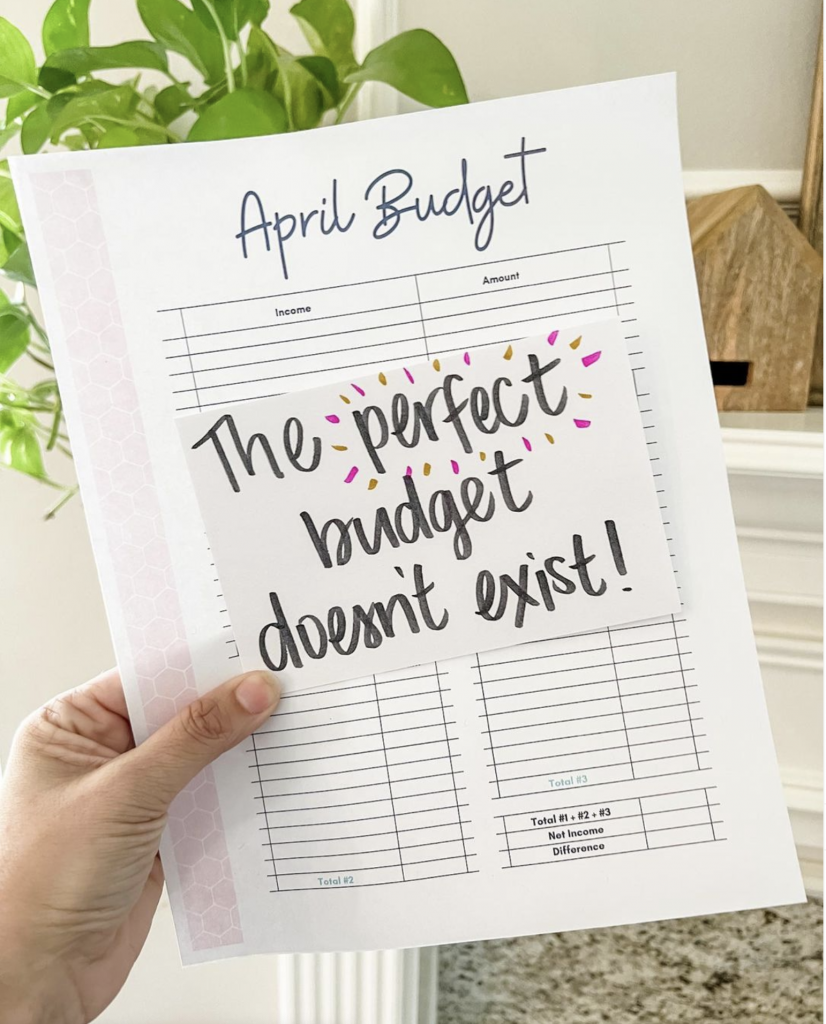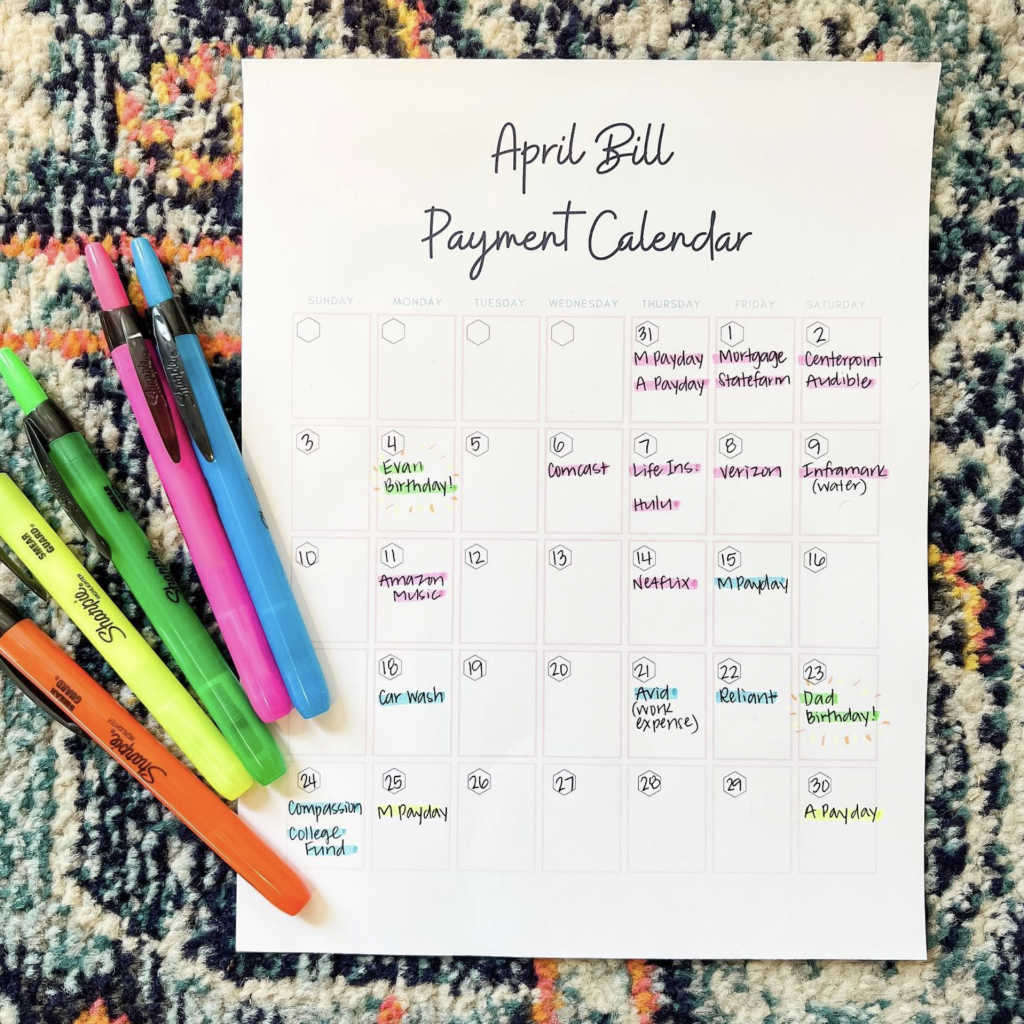Have you ever written a budget just to throw it away a few days later because something unexpected came up?
You created a budget with the best intentions, but then life happens. You get carried away swiping your card and before you know it your budget is blown…again!
Or maybe you unintentionally spent too much at the grocery store leaving you with not as much money in your checking account. Next thing you know, you’ve thrown your budget in the trash because unexpected expenses or overspending has caused you to lose faith in the plan you had set.
You may have even uttered the words I’ll just start over next month.
Matt and I adopted this habit when we first started budgeting. As soon as something went wrong (because something always comes up), we would throw in the towel and vow to do better next month. The problem was we would immediately overspend and revert to our old money habits. Everything felt like “fair game” because we no longer had a budget that we were trying to stick to. I would then go on a shopping spree, spend too much money, and justify it by saying we would get back on track next pay period. Ultimately, these habits were keeping us from reaching our financial goals sooner.It only took a few months of repeatedly “starting over” to realize we were setting ourselves up for failure. At that moment, I realized that our budget would never be perfect. And guess what! That’s totally okay.

The magic of the mini-budget
Budgeting is less about the math and more about your flexibility and willingness to stick with it! If you’ve found yourself on the same repeated cycle of starting with budgeting only to give up along the way, then you need to try writing a mini-budget. Here’s why:
1). Mini budgets allow you to continue making progress…even after life happens
Mini budgets help you continue to make forward progress with your money…even when you’ve been hit with unexpected expenses and you’d rather give up on budgeting altogether. Instead of giving up, you’re getting back on track! You recognize the problem and you set out to fix it instead of just saying you’ll start over next month. Giving up is easy. Writing a mini budget and getting back on track is where the real work and growth lies.
2). Mini budgets hold you accountable
Mini budgets are amazing because not only do they hold you accountable for your finances, but they give you the opportunity to learn how to be flexible with your money. No one is perfect and no budget is perfect. Every budget will need to be tweaked every now and then. I personally love that mini-budgets allow us to identify what went wrong with our previous budget and how to take steps to prevent that from happening in the future. Writing a mini budget is not about beating yourself up or giving yourself a hard time for your past spending. Instead, it’s an opportunity to manage your money better.
3). Mini budgets set you up for success
I personally try to cook dinner at home 5-6 nights each week. The only problem? I don’t really like cooking. In fact, I would go so far as to say I “strongly dislike” cooking dinner. While others find comfort in the kitchen, creating a lovely meal for their family, I simply cannot stand it. Yet every week, I cook dinner for my family (my husband helps too). The only way I’m able to stay somewhat consistent with cooking dinner at home is because I spend time on the weekend planning out the dinners I will make that week. I always plan easy meals on Thursday because those are the days I’m tempted to order pizza just to stay out of the kitchen.My meal plan sets me up for success. It’s THE THING that keeps me on track with cooking healthy, simple meals for my family instead of grabbing takeout every night.
Just like I need a meal plan to help me be successful when it comes to cooking at home, we need a mini-budget to help us be successful with our money!
What is a mini-budget, exactly?
Well, it’s just a smaller budget (a miniature budget!) that you’ll write from THE MOMENT you realize your budget is off track until the day before your next pay day, no matter how long that timeframe is! The mini-budget lays out how much money is left in this person’s checking account as well as where every penny will be going!
Mini-budgets have helped SO MANY people that I’ve worked with because they act as a tool to help get you back on track when life doesn’t go as planned.
And when does life actually go as planned?
How do I write a mini-budget?
The best part about a mini budget is that it’s incredibly easy to write. I’ve been known to write a mini-budget on a sticky note and keep it on the fridge for 5 days until payday hits!
Here are the simple steps to follow to write your first mini budget:
1). Write down the current balance in your checking account
After overspending and getting off budget, you might be tempted to avoid or ignore this first step. It might scare you to look at your checking account balance because you know you’ll feel a tinge of guilt and frustration with your choices.
If you ignore the problem, it doesn’t exist, right? Wrong.
That’s what we like to think to ease the stress of dealing with the problem, but it can’t be farther from the truth. Sit down, pull out your phone, and open your online banking app. Write down your balance. If you have any pending transactions, be sure to deduct those from the balance. This number is your starting point.
2). Determine how many days you have until your next payday.
Look at your calendar and determine when your next payday is. How many days do you have from today until that date? Write that number down. The number of days until your next payday is how long your mini-budget will last. I’ve written a mini-budget that last 14 days as well as a mini-budget that lasts me 3 days until payday.
3). List out your expenses.
Make a list of expenses you expect to have from now until payday. Don’t forget to include bills that are automatically drafted from your bank account. If you aren’t sure which bills you have coming up, look at your last month’s bank statement for guidance. Be sure to check your calendar and make sure you don’t have any events coming up that you’ll need to budget for such as birthdays, Christmas parties, or special events with friends. Include any variable expenses such as groceries, gas, and restaurants in your mini-budget.I personally like to think through each day until my next payday. I ask myself if I anticipate spending money on that particular day. If the answer is yes, I include it in my mini budget.Your goal is to create a plan for your money until payday, even if payday is only a few days away.
4). Create your mini-budget.
Create a mini-budget using the money you have left in your account and the expenses you listed. You can jot your-mini budget down on a spare piece of paper, sticky note, or even a budget page. I personally find handwriting my mini budget helps solidify my expectations for my money in my brain.
5). Post your budget where you can see it every day.
Once you’ve written your mini-budget, you need to post it where you can see it. Don’t keep it tucked away in a binder or on an excel spreadsheet. It’s important that this budget is visible and at the top of your mind.Go back and reference the mini-budget often. If you find yourself off track again, write another mini-budget.
Example of a mini-budget
Let’s say you have $400.00 in your checking account and you’ve got 5 days left until payday. This $400 needs to last me FIVE whole days. And it needs to cover the remaining bills due as well as absolute necessities, in this instance: groceries, gas, electricity, and food.
Groceries: $100
Gas: $40
Electricity: $200
Restaraunt: $50
Buffer: $10
Total: $400.00
It’s that simple!
When you are willing to write a mini budget after you fall off track with your money, you’ll be more aware of where you stand financially and how you can continue to grow closer to your money goals! We all know ignoring your finances won’t make them any better. When you are willing to spend time working on your money, you begin to develop better financial habits that can have a lasting impact on your life

Today’s episode is brought to you by my FREE budget class. This is the four step framework to budget for your best life without sacrificing your weekly latte runs.
So true story back whenever my husband I were working to pay off debt, and we were trying our best to live on less. I loved celebrating that I made it to every Friday by running by Starbucks. I wanted to order myself a grande latte.
I remember reading a book that basically said you have to CUT OUT all extra spending. And I was adamant that I would not cut out my weekly latte run. I wanted to be able to write a budget that allowed me to enjoy things like that, and not live on basically NO money at all.
And that’s what this class is all about!
In this class, you’re going to learn the three massive mistakes that everybody makes with their budget, and why they are costing you money. I’m going to be sharing with you the secret to finding more money in your budget each month so you can do things like pay off debt, save money, or buy weekly lattes. The class also comes with training notes, free printables and cheat sheets.
I hope to see you there! Sign up below!

